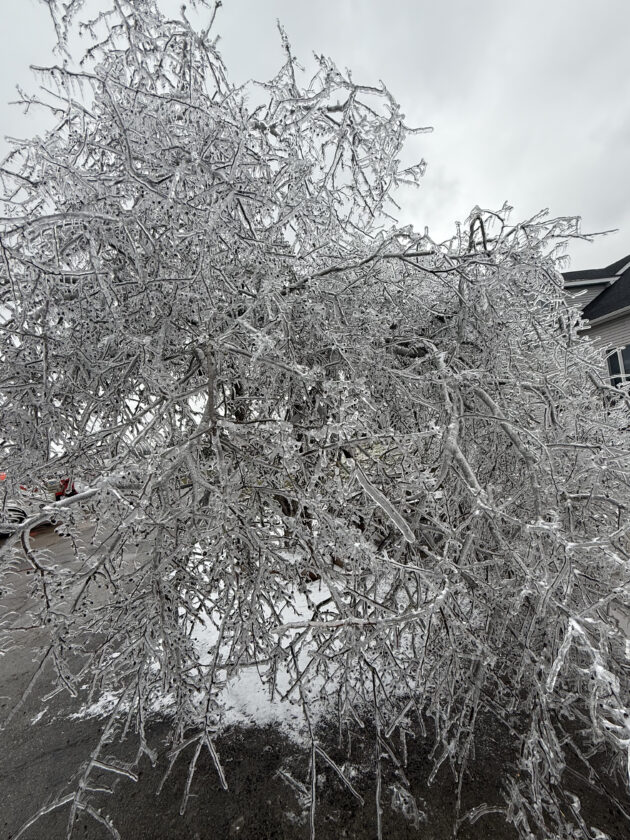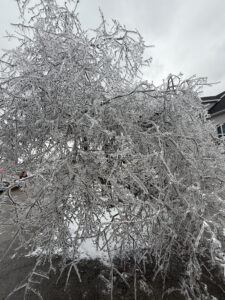FEMA denies ice storm funds for utilities, residents

Courtesy Photo Thick ice covers a tree in Alpena after an ice storm struck northern Michigan in late March. The storm caused extensive power outages and damage and came with a high cost for many.
ALPENA — The federal government is not going to financially assist utility companies and residents who received damage and incurred large costs from the spring ice storm in Northern Michigan.
On Monday, Gov. Gretchen Whitmer announced that the Federal Emergency Management Agency denied several key portions of Michigan’s request for critical assistance in the wake of the historic storm in late March, including Northeast Michigan.
Whitmer intends to appeal FEMA’s decision in the next 30 days, she said in a press release on Monday.
“Many Northern Michiganders are still reeling from the impacts of the ice storm that devastated communities earlier this year,” Whitmer said in the press release. “Michigan families and businesses deserve the support they need to recover from these storms. That’s why I’m appealing FEMA’s disaster aid denials. I’ll keep fighting like Hell to deliver relief for our residents, local governments and utility providers.”
After conducting an extensive survey and cost analysis, FEMA did grant funding for local municipalities to help offset the unexpected costs from damage, cleanup, emergency shelters, and other expenses. Utility companies, residents, and small businesses will not be eligible, however.
In late March, a severe ice storm paralyzed northern Michigan with extreme ice accumulation, causing prolonged and widespread power outages, hazardous conditions, and record levels of infrastructure damage. In July, President Donald Trump approved a federal disaster declaration authorizing FEMA Public Assistance funding for emergency work and certain permanent repairs across 13 counties and the Little Traverse Bay Bands of Odawa Indians. The hope was FEMA would expand from that, but that turned out not to be the case.
The denial by FEMA also takes away the Hazard Mitigation Grant Program, which would have been used for long-term projects to reduce future risks.
Congressman Jack Bergman, R-Watersmeet, also expressed his dismay about the decision by FEMA. He said those who need financial help from the impacts of the storm and subsequent power outages that lasted weeks for some, should receive the needed help to rebound.
“Northern Michigan families and communities are still carrying the burden of the devastating ice storm, and they deserve the full support of FEMA to recover,” Bergman said. ” I’m committed to fighting for the resources our region needs, which is why I strongly support Governor Whitmer’s appeal to FEMA’s denial. This is about standing up for northern Michiganders and ensuring we are not left behind.”
U.S. Senator for Michigan, Gary Peters, D-Bloomfield Township, echoed Bergman’s thoughts. He said he will support the governor in any way possible during the appeal process.
“Northern Michigan was devastated by the ice storms earlier this year, and families and businesses are still struggling to rebuild,” said Peters. “Recovery will continue to be out of reach without these critical resources from FEMA, which is why I support Governor Whitmer’s appeal. Michiganders deserve better.”
As a result of the funding denial for utility companies, customers will likely have to pay more monthly to help pay off loans and other means companies used to acquire money to pay for system repairs.
Presque Isle Electric & Gas Co-op (PIE&G) estimates when all of the repair and replacement costs are tallied, it will cost about $150 million, as pretty much the entire electrical system needed replacing. The co-op, which is a not-for-profit organization, has already established an emergency line of credit for $150 million. To cover the $8.5 million a year payment that only covers the interest on the loan, the principal on the loan would balloon the payment to $10 million.
PIE&G CEO Alan Berg said the co-op added a $20 a month fee on every metered bill to pay the ongoing interest costs for a $150 million loan, but then it was decided to borrow the full $150 to be sure all of the repair and replacement costs would be covered. Berg said although more money was borrowed, he doesn’t expect the monthly fee being increased.
Berg said the utility has worked with FEMA and he is still confident that PIE&G may be able to get some federal help. He said it may not be enough to put a large dent in the debt, but it will help.
“I think we’ll still get something and we want to get as much as possible,” he said. “That is why we support the governor’s appeal.”
On the PIE&G website, it says the $20 a month added charge could be lowered or removed in the future, depending on how much funding the utility receives. The payment could also linger for many years until the loan is paid in full.
Alpena Power Co. estimates it has about $2.5 million in ice storm repair costs and $350,000 in lost revenue from the outages. It also faces the potential of having to credit customers an additional $1.5 million in Michigan Public Service Commission-imposed billing credits to customers for the many days they were without power.
The utility filed a request at the MPSC for a waiver on outage bill credits and a prehearing on the matter was held in May. A cross examination hearing is slated for Nov. 17, so it will be some time before Alpena Power will know for certain if it will have to issue the billing credit or not.
These power outage credits do not apply to customers of electric cooperatives like PIE&G or municipal electric utilities, which are not regulated by the MPSC.
Steve Schulwitz can be reached at 989-358-5689 or sschulwitz@TheAlpenaNews.com. Follow him on X @ss_alpenanews.com.





